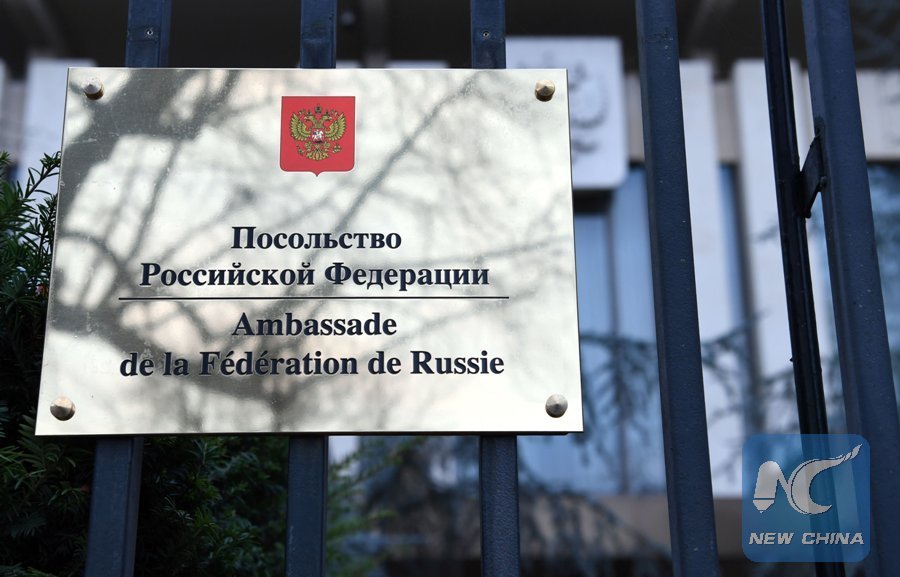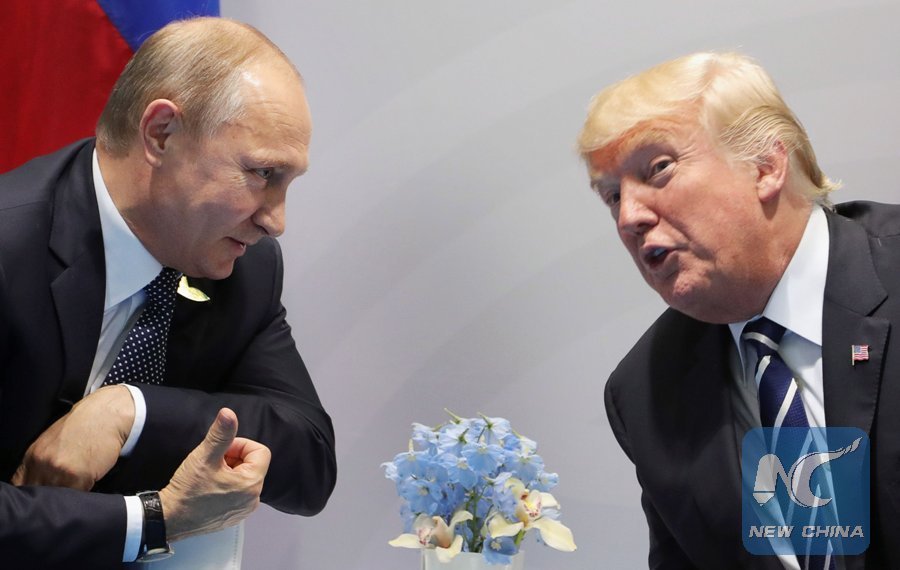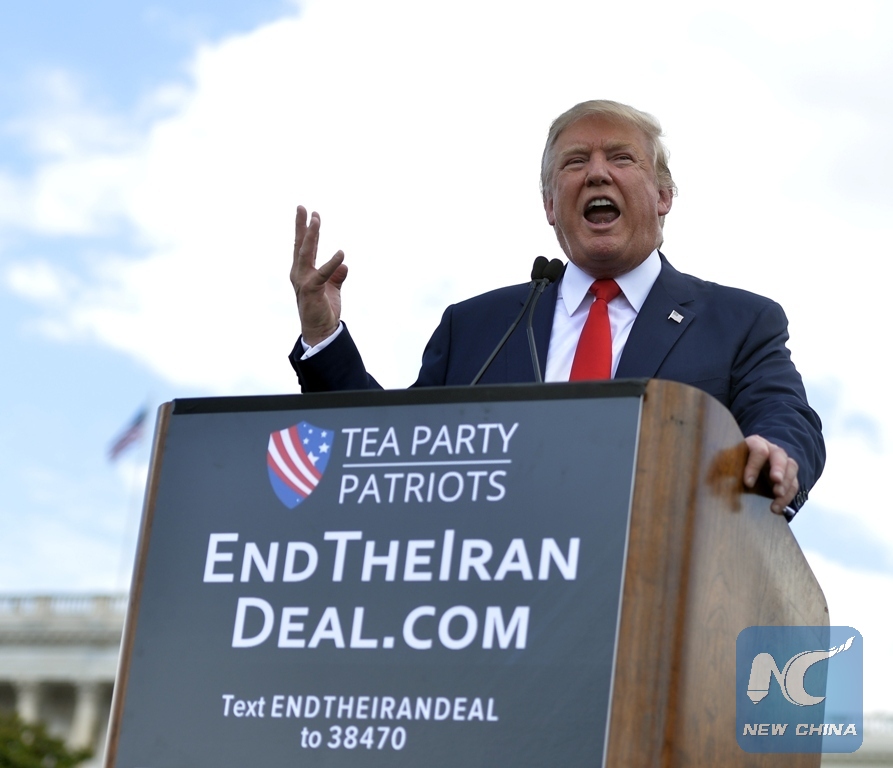
File photo taken on Feb. 14, 2017, shows a plaque at the embassy of the Russian Federation in Paris. (Xinhua/AFP)
WASHINGTON, March 26 (Xinhua) -- The United States and Europe have rarely showed unity on global hot-button issues ranging from Iran nuclear deal to the White House's promised tariffs on aluminum and steel, but not this time when the United States joined Britain's allies in Europe and across the world in expelling Russian diplomat in response to a nerve agent attack.
At least 137 Russian diplomats were ordered out by 24 government, including 60 Russians from the United States, in a diplomatic confrontation exacerbated by the poisoning of an ex-spy in Britain.
A new blow to U.S.-Russia ties, the unprecedented teamed up action across the Atlantic, however, exposes to a certain extent a deep rift between Washington and its European allies, analysts say.
DEEP-SEATED MISTRUST
U.S. President Donald Trump on Monday ordered the expulsion of 60 Russian diplomats and intelligence officials, and the closure of the Russian consulate in Seattle, to retaliate for the poisoning of Sergei Skripal, a former Russian intelligence officer, and his daughter in London earlier in March.
Senior U.S. officials said that the expelled Russians "are intelligence officers being cloaked by diplomatic positions" in the United States and are considered to be aggressive collection personnel.
Monday's actions, later joined by 14 EU members, Ukraine and Canada, were not merely a response to the poison attack, said the officials. "It's also part of a broader set of actions that the Russians have taken for quite some time internationally: a steady drumbeat of destabilizing any aggressive actions."
Dan Mahaffee, senior vice president and director of policy at the Center for the Study of Congress and the Presidency, told Xinhua that the number of Russian agents has been viewed with growing concern in the United States and allied countries.
The U.S. moves "are far more than symbolic as they are an attempt to hinder Russian intelligence gathering in these countries," he said.
Experts said that underneath the moves were the West's deep-seated mistrust with Moscow, which was further escalated by Russia's reported intervention in the 2016 U.S. elections and the spy poisoning incident.

In this file photo taken on July 7, 2017, U.S. President Donald Trump (R) and Russia's President Vladimir Putin speak during their meeting on the sidelines of the G20 Summit in Hamburg, Germany. (Xinhua/AFP)
The Trump administration has been under pressure from inside the country and the West. The mid-term elections urge Trump to "play tough" against Moscow, and Western allies have been disheartened by the U.S. reluctance to attack directly at Moscow over the poisoning attack, as required by the North Atlantic Treaty Organization treaties, they added.
DIVISION BETWEEN U.S., EUROPE
A disagreement remain between the United States and Europe over how to address the "sunset" clauses of the Iran nuclear accord, key restrictions on Tehran's nuclear program which is set to expire in about a decade.

File Photo: U.S. Republican presidential candidate Donald Trump speaks during "Stop the Iran Deal" rally at West Lawn of the Capitol in Washington D.C., capital of the United States, Sept. 9, 2015. (Xinhua/Bao Dandan)
Washington urges making nuclear limits on Iran permanent, while the Europeans argue that the demand would mean renegotiation of the deal itself.
Since January, the United States has spearheaded talks with France, Germany and Britain over its major concerns about the nuclear deal.
Washington wants its European allies to agree on further measures against Iran in return for keeping a landmark nuclear deal with Tehran alive, U.S. officials have said.
To keep Washington in the deal, the United States and Europe must come to an agreement, said Brian Hook, the State Department official who led the U.S. delegation for closed-doors meetings between the U.S., Iran, Russia and other major nations in Vienna
In the wake of Trump's announcement to impose a 25-percent tariff on steel imports and 10-percent on aluminum imports amid global opposition, the European Union (EU) planned "a whole arsenal" of counter-measures.
Europe "wants to avoid escalation" but "must keep the multilateral framework" because "protectionism is never the answer: protectionism is nationalism, nationalism is war and the war only makes losers," European Financial Affairs Commissioner Pierre Moscovici told a French television news channel earlier this month.
DIPLOMATIC TIT-FOR-TAT TO CONTINUE
Although the Trump administration has left room for talks and cooperation with Moscow by saying that the president still remains open to working with the Russians in areas of mutual concern, for example, counterterrorism, experts said current West-Russia diplomatic collision is expected to continue.
Brookings Institution Senior Fellow Darrell West told Xinhua that there is no guarantee that Russia will change its course.
Senior U.S. officials, while announcing the expulsion decision on Monday, said the United States supports Britain's decision not to provide samples of the nerve agent to Russia, despite Moscow's repeated calls for co-investigation.

Britain's Prime Minister Theresa May (3R) meets members of the public during her visit to Salisbury, southern England, on March 15, 2018, where she visited the areas where former Russian double agent Sergei Skripal and his daughter Yulia went, and were discovered, following an apparent nerve agent attack on March 4. (Xinhua/AFP)
"The U.K. has accepted an offer from OPCW, the Organization for Prohibition of Chemical Weapons, to assist in the investigation. Sharing samples with Russia would not provide further clarification on the origin of the agent used in the attack," they said.
With Russia's pledge to take "mirror-like" retaliation for the West's expulsion of its diplomats, and the U.S. warning of further response, the Washington-Moscow ties are expected to remain chilly.
William Courtney, adjunct senior fellow of Rand Corporation, said that West-Russia relations will become more strained, but the West is willing to run this risk.
"It wishes to raise the cost to Russia of persistent misbehavior," he said, "Channels for Western dialogue with Russia may exist, but are of little value unless progress can be made on key issues. What will influence them is whether Russia takes actions to address Western concerns."
(Matthew Rusling from Washington contributed to the story)

